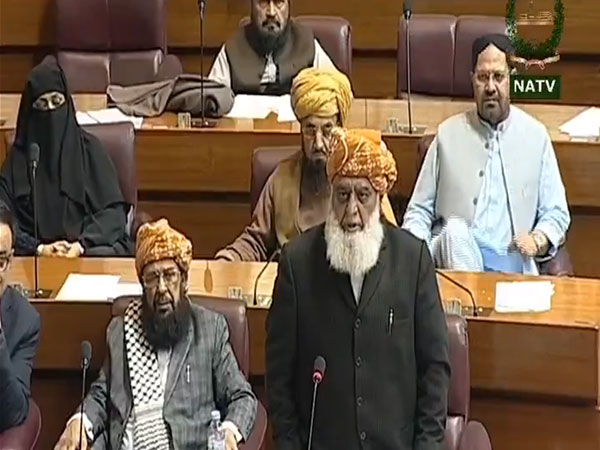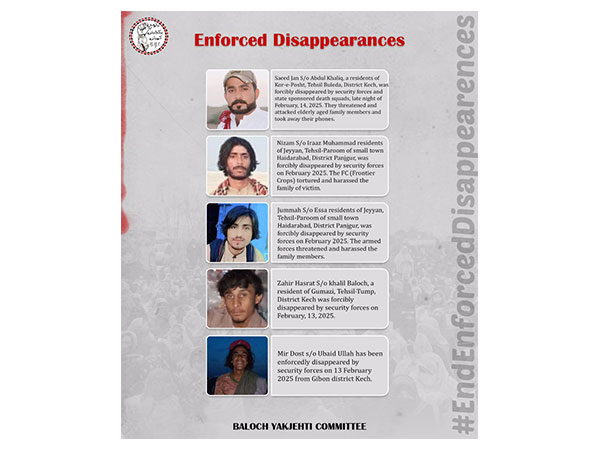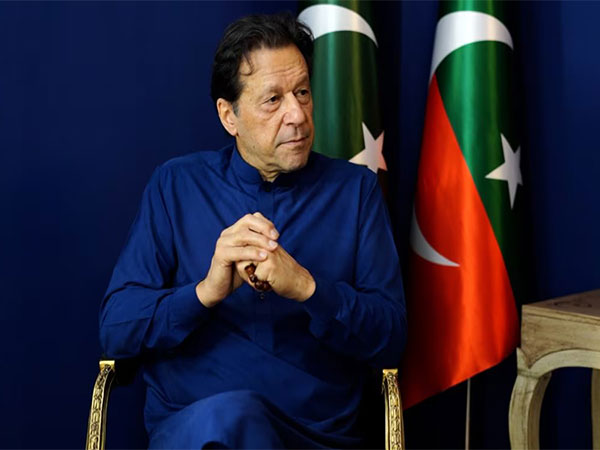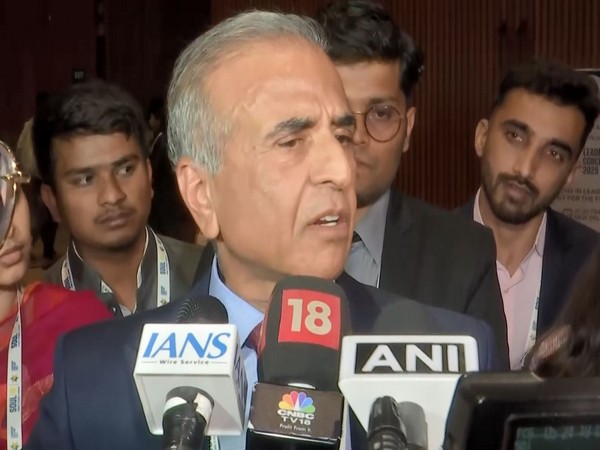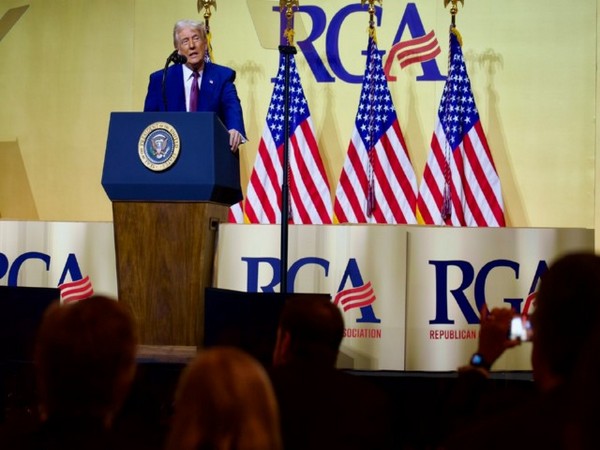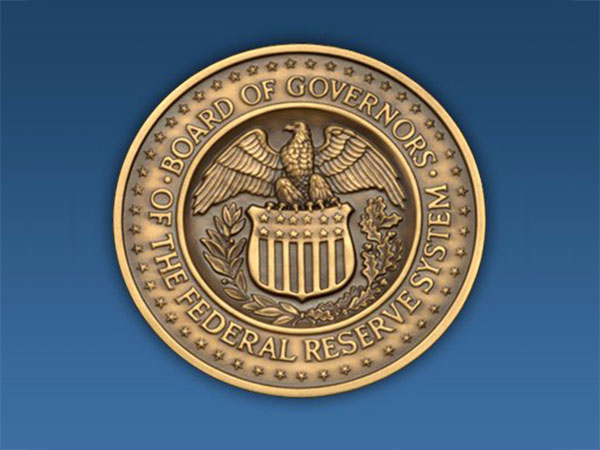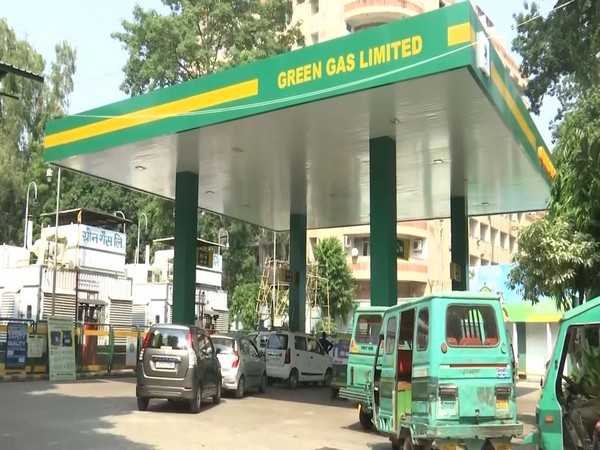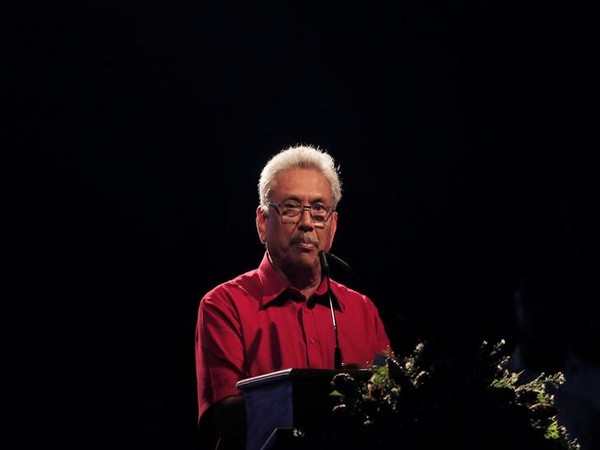
Sri Lanka People's Front party presidential election candidate and former wartime defence chief Gotabaya Rajapaksa speaks during the final election campaign rally in Homagama, Sri Lanka November 13, 2019. REUTERS/Dinuka Liyanawatte
Colombo [Sri Lanka], May 6 (ANI): Sri Lanka President Gotbaya Rajapaksa will declare a state of emergency with effect from Friday midnight, local media reported. “A state of emergency will be declared by the President with effect from midnight today – PMD (President’s Media Division),” Daily Mirror reported.
Earlier, President in a special meeting requested Prime Minister Mahinda Rajapaksa to step down from his power as a solution to the ongoing political crisis in the country. In a special meeting between President and the cabinet ministers, PM Rajapaksa said that if the new government will solve the economic crisis and could bring an immediate solution, then he would give his blessing to the new government, Daily Mirror reported.
However, there is yet to be an official response on whether Mahinda Rajapaksa will tender his resignation or not. Meanwhile, over 2,000 trade unions participated in today’s nationwide hartal and strike against the President, Prime Minister, and the government, Colombo Page reported.
All Ceylon Transport Workers Union, Sri Lanka Railway Station Masters’ Union (SLRSMU), the University students, and many other unions are protesting today against the Rajapaksa family. Sri Lanka is struggling with acute food and electricity shortages, forcing the country to seek help from its neighbours. The recession is attributed to foreign exchange shortages caused by a clampdown on tourism during the COVID-19 pandemic. The country is unable to buy sufficient fuel and gas, while the people are being deprived of basic amenities as well.
The economic situation has led to huge protests with demands for the resignation of Prime Minister Mahinda Rajapaksa and President Gotabaya Rajapaksa. (ANI)
Foreign diplomats, rights groups decry Sri Lanka’s state of emergency
Colombo [Sri Lanka], May 8 (ANI): Foreign envoys to Sri Lanka and rights groups on Saturday expressed concern over the declaration of a state of emergency by President Gotabaya Rajapaksa. They fear that police might use force against peaceful protesters amid the country’s worst economic crisis in recent memory, reported Taipei Times. US Ambassador to Sri Lanka Julie Chung wrote on Twitter that she is “concerned” by the state of emergency, adding that “the voices of peaceful citizens need to be heard.”
“And the very real challenges Sri Lankans are facing require long-term solutions to set the country back on a path toward prosperity and opportunity for all. The SOE (state of emergency) won’t help do that,” Chung added.
Canadian High Commissioner to Sri Lanka David McKinnon said Sri Lankans have a right to peaceful protest under democracy and that it is “hard to understand why it is necessary, then, to declare a state of emergency.”
The economic and political situation in the Indian Ocean island nation has triggered countrywide protests demanding the resignation of Rajapaksa and his powerful ruling family, reported Taipei Times. Rajapaksa on Friday issued a decree declaring a public emergency. He invoked sections of the Public Security Ordinance that allow him to make regulations in the interests of public security and preserving public order, and for the maintenance of essential supplies.
Under the emergency regulations, Rajapaksa can authorize detentions, seize possession of the property and search any premises. He can also change or suspend any law.
Sri Lanka is near bankruptcy. It announced that it is suspending repayment of its foreign loans and its usable foreign currency reserves have plummeted below USD 50 million, reported Taipei Times. The country has USD 7 billion in foreign loan repayments due this year out of USD 25 billion to be repaid by 2026. Its total foreign debt is USD 51 billion.
Police used tear gas and a water cannon twice on Friday at protesters near the parliament who were criticizing lawmakers for not ousting the president and his government, whom they say are responsible for the economic crisis, reported Taipei Times.
Protesters are angry that lawmakers elected a government-backed deputy speaker of parliament by a large majority when the protesters say they should be voting Rajapaksa’s government out of power.
Police first fired tear gas at a student-led protest that began on Thursday after the election of the deputy speaker in what was seen as a key victory for the governing coalition.
Separately, police dispersed more protesters with tear gas on Friday night, also near parliament.
Amnesty International said protests have been peaceful and the authorities have unlawfully restricted the right to freedom of peaceful assembly, reported Taipei Times. Protesters have vowed to continue their demonstrations despite the emergency law. (ANI)
Sri Lanka: UNICEF expresses concern over violence during protests
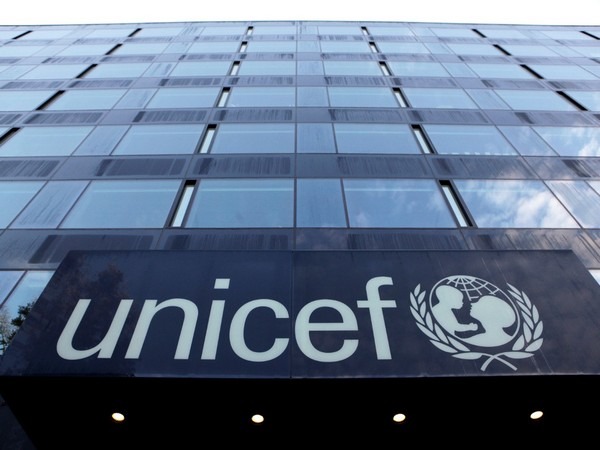
Colombo [Sri lanka], May 7 (ANI): The United Nations Children’s Fund (UNICEF) expressed its concern over reports of violence during protests involving children in Sri Lanka, amid the ongoing economic and political crisis in the country. “UNICEF is concerned with reports of violence during protests involving children. All actors must guarantee the right to peaceful assembly and freedom of expression, including for children,” UNICEF said in a statement according to Colombo Page.
The UN organ went on to emphasize that “according to the Convention on the Rights of the Child, children and adolescents have the right to participate and express their opinions on issues that affect them.” “The State, local communities, and families have a shared responsibility to protect children and safeguard their rights,” the statement read.
Saying that all kinds of violence must stop, UNICEF called on “law enforcement agencies to avoid the use of force and ensure that fundamental guarantees for the protection of children remain applicable everywhere, at all times”. “Every adult must act with a sense of responsibility and avoid exposing children to all forms of violence, including during protests,” the statement said.
On Thursday, Sri Lanka Police fired tear gas on the protesters on Thursday in order to disperse the protest staged by University students under the theme “Let’s oust the government! Let’s reverse the system!” outside the parliament.
Taking to the streets to protest against the government led by the Rajapaksha family, the student protestors demanded that President Gotabaya Rajapaksa and his brother Prime Minister Mahinda Rajapaksa should end their rule of the country.
Meanwhile, the massive people’s struggle “Go Home Gota” calling President Gotabaya Rajapaksa to step down at the Galle Face entered the 29th day today. Last month, in a statement on Children taking part in mass protests against the government in Sri Lanka, UNICEF had highlighted the Children’s rights to peaceful assembly and freedom of expression, including in peaceful protest enshrined in the Convention on the Rights of the Child, which Sri Lanka has signed and ratified.
“They should be given the opportunity to meaningfully voice their own concerns and participate in matters that affect their futures, and they need to be listened to,” UNICEF said.
Sri Lanka is facing its worst economic crisis since independence with food and fuel shortages, soaring prices, and power cuts affecting a large number of the people, resulting in massive protests over the government’s handling of the situation.
The recession is attributed to foreign exchange shortages caused by a fall in tourism during the COVID-19 pandemic, as well as reckless economic policies, like the government’s move last year to ban chemical fertilizers in a bid to make Sri Lanka’s agriculture “100 per cent organic”.
Due to an acute shortage of Foreign exchange, Sri Lanka recently defaulted on the entirety of its foreign debt amounting to about USD 51 billion.
The economic situation has led to huge protests with demands for the resignation of Prime Minister Mahinda Rajapaksa and President Gotabaya Rajapaksa. (ANI)
